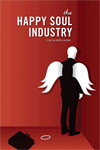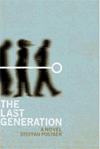Problem Child with a High Salary
January 11, 2021

You had lofty titles: Executive Creative Director, Chief Creative Officer, even Executive Chairman. You were on the board of directors at the most famous advertising agency in Chicago, supposedly the youngest member ever. During this period you commanded a huge salary, more than the President of the United States. Frankly, a lot more, especially when you factored in bonuses and stock options. You earned it; well maybe not all of it and toward the end probably less. Then you got asked to leave, to seek opportunities elsewhere, fired. The last time was probably the mortal blow. You didn’t know it but the job you had now was not going to last.
When it came to work, you were only great at two things: copywriting and presentations. You wrote your way into the boardrooms of the world, turning words over and over until they shone like gemstones. Once there, you would sell. Oh, could you ever! You loved selling and did not demure from it like so many other creative people. Those fools, you thought. Didn’t they know advertising and selling went hand in hand? Processing stage fright into stage-might, you had utter command. At times, it was breathtaking. You were excited to perform and it showed. Your confidence seldom came off as a con. During presentations you were like a kid unwrapping gifts at Christmas.
Alas, while showmanship mattered on the way up, once there, not so much. As a director, they wanted you to hire and fire; delegate and operate; things you came to realize you weren’t very good at. You liked to write and sell work. Truth be told, you weren’t interested in the other stuff. It all seemed beside the point, what you had to do as opposed what you wanted to do. Now it was you who was playing the fool.
At best, you’d possessed what the CEO called, “emotional intelligence,” a backhanded compliment, a quality your peers pretended to admire then grew to despise. In management meetings you lectured that creativity was messy and impossible to regimen. But alas, your left-brain partners valued process over intuition. They lacked patience for the soft skills inherent in the creation of ideas. They couldn’t scope it. So they loathed it. For a so-called creative agency this was, in your view, anathema. And so you had refused to whip your troops into creating. You put good ideas on the wall, and quickly. But it was never enough. Eventually, you became a problem child with a very high salary.
to be continued…
Death & real life: Johnnie Walker “spec” spot gamely walks through advertising’s biggest taboo.
December 21, 2015
I keep ruminating over this film for Johnnie Walker the way one might ponder a glass of scotch itself. It’s that good, completely deserving of Adweek’s hyperbolic praise. Maybe it’s even better than the Cannes winning “Keep Walking” film done a few years ago by advertising giant, BBH London -attached below. Pitting the two is perhaps insulting to both. Still, the fact that the newer piece is a spec film made by a pair of film students, Daniel Titz and Dorian Lebherz is truly remarkable. Everything about their film is done with grace and beauty. I hesitate to even call it a “spot.” This is a statement piece, for them and the brand. Clearly, these two young men have old souls. Brave ones, too. Blessedly unaffected by the myriad politics of Adland, they merely did the right thing. Oh, were that it were!
Scotch whiskey has always been known as a thinking man’s drink. It has depth and character best appreciated by sipping. This differentiates the liquor from most other spirits. Unfortunately, this difference is seldom romanced by the advertising industry. Instead, we get endless variations of people having a good time. While in some portrayals the partying around whiskey may be more uptown it’s still partying. Advertisers are hell bent against exploring deeper truths about these brands for fear of coming off as old fashioned, melancholy or maudlin. Drinking alone was and is considered verboten for 99% of all spirits’ advertising. Likewise, men drinking without women (or vice versa) is almost as taboo. And so on. In Adland, solitude means loneliness and depression. God forbid a gentleman has a neat drink at twilight. Next, he’ll be reaching for a gun!
I know of what I speak. As a creative at Leo Burnett, I worked on Johnnie Walker Black Label and Red Label. I was thrilled to have written and sold the campaign, “Welcome to Civilization.” But Lord, what an uphill battle. Alex Bogusky considered it the best thing in my portfolio. Probably because it went deeper. Though not as deep as what we have here.
In this film, two young men –brothers- return their father’s ashes to the sea. In the process of their journey, they share a glass and toast the departed. By no means are they whooping it up. But they’re not crying or miserable either. They are celebrating a good life and yes, a good death.
The kiss of death? Hardly. Even if its topic is an ending, there is something deeply life affirming about this story. These young men are graceful and true men, doing something wonderful. And in doing so aren’t they just extensions of their father – a man who obviously taught them well?
This is the very best thing a spirit can be a part of. Not the dumbass partying of frat boys looking for a good time but a reflection and celebration of a life well lived. It’s easy to blame brand managers and the like for insisting on “happy” and “fun.” But I actually think we are all culpable. Quiet moments, especially the quieting of life, are topics we constantly push aside, mostly out of fear. Advertising yields to this fear like butter to a knife.
But this “commercial” gamely looks right at death and in turn reaffirms life. Finally, I should add that though the script is lyrical and stunning, it is also hard working copy, seamlessly integrating the brand’s longtime theme, “Keep Walking” in a way that elevates it like never before.



 The Happy Soul Industry
The Happy Soul Industry The Last Generation
The Last Generation